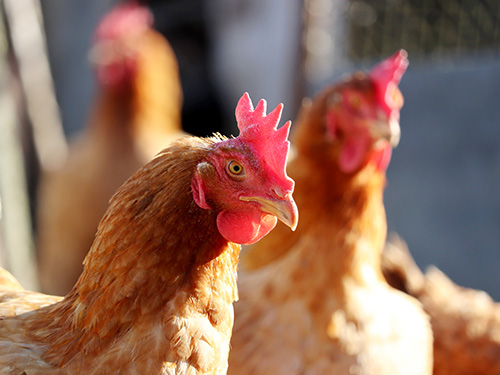Insulating Your Chicken Coop for Cold Weather
Dec 09, 2024

As temperatures drop, it’s essential to create a warm, safe environment for your chickens. While chickens are hardy animals, prolonged exposure to temperatures below 25°F can be harmful. By insulating your chicken coop effectively, you can retain heat, block cold drafts, and ensure your flock stays comfortable throughout the winter.
By taking the time to insulate your chicken coop and allowing for proper ventilation in strategic areas, you can keep your flock safe and comfortable all winter long. These simple adjustments make a big difference, ensuring your chickens stay healthy and happy no matter how low the temperatures drop.
Find the nearest Co-op location here. For more content like this, check out the latest issue of The Cooperator.
The Ceiling
The ceiling is one of the most important areas to insulate, as heat naturally rises. Use materials like foam board or fiberglass sheets covered with plywood to protect against pecking and simplify cleaning. If insulation isn’t possible, creating an air gap with flattened cardboard or feed sacks between the ceiling and roof can help trap heat. To prevent moisture buildup, ensure there are small ventilation openings near the roofline to allow air to circulate without creating drafts near the roosting area.The Walls
Drafts can quickly cool the coop and make it uncomfortable for your flock. To identify problem areas, hold a strip of tissue paper near the walls; if it moves, seal the gaps with caulk or spray foam. For larger areas, temporary solutions like tarps, plastic sheets, or even old blankets can provide a layer of insulation while blocking drafts. Be cautious not to block any upper vents that help release moisture and keep the air fresh.The Windows
Windows can be a significant source of heat loss. Weather stripping helps seal gaps, while bubble wrap or clear plastic sheets mimic double-pane insulation. Properly positioned vents and windows also ensure air circulation to prevent moisture buildup, which can lead to frostbite. Place windows higher up on the walls or add ventilation openings above the roosting area to balance warmth with airflow.The Floor
A thick layer of bedding, such as wood shavings, straw, or shredded paper, can insulate the floor and generate heat as it composts. Regularly stirring the bedding helps it break down and release warmth. For elevated coops, adding insulation beneath — such as foam board or straw bales — can block cold drafts and help retain warmth.Small Coop Tips
Small coops lose heat more quickly, so additional steps may be needed. Surround the coop with straw bales or tarps, or move portable coops into a garage or shed during extreme weather. Wrapping attached pens with tarps or plastic sheets can also protect against cold winds.By taking the time to insulate your chicken coop and allowing for proper ventilation in strategic areas, you can keep your flock safe and comfortable all winter long. These simple adjustments make a big difference, ensuring your chickens stay healthy and happy no matter how low the temperatures drop.
Find the nearest Co-op location here. For more content like this, check out the latest issue of The Cooperator.